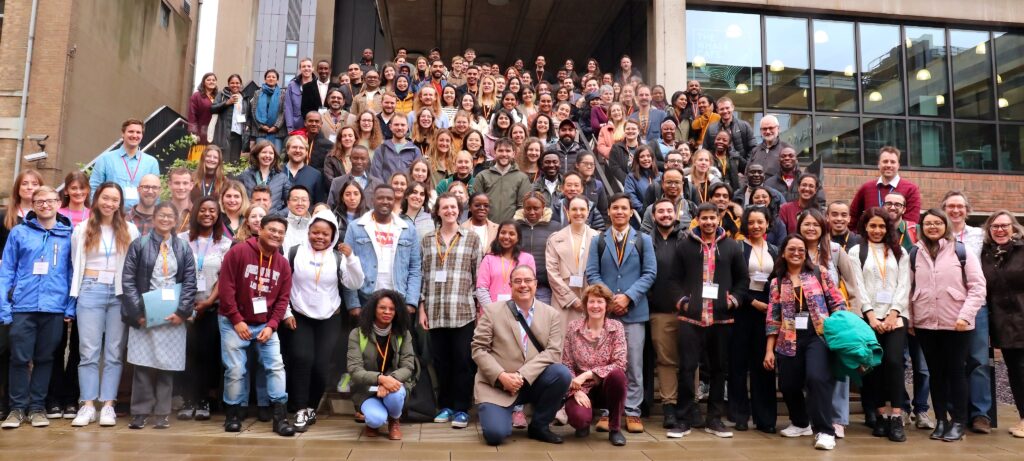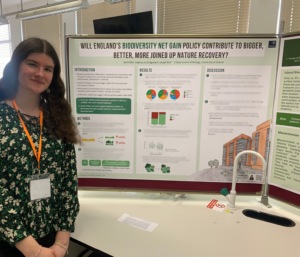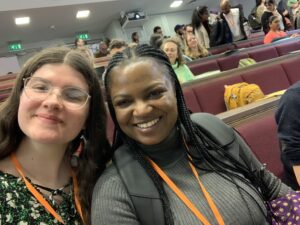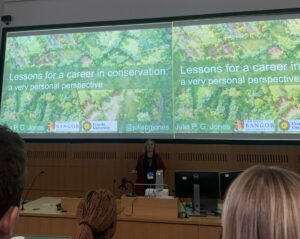University of Oxford
11a Mansfield Rd
OX1 3SZ
UK

In the last week of March, Cambridge’s Museum of Zoology came alive with graduate students from across the world for the 24th annual Student Conference on Conservation Science (SCCS). The conference invites young conservation researchers to attend a series of talks, workshops and poster sessions to build our understanding of conservation beyond our subject area, and provides networking opportunities, skills building, and a platform for us to showcase our research.
For a lot of us, it was our first time presenting our research. There’s something special about seeing for the first time a tangible piece of work – whether a presentation or research poster – showing the research you’ve spent the last year working on. Our first forays into the world of academia, and a chance to tell others about a topic we find important and want to share with the world. SCCS welcomed attendees from 43 countries, so the showcased research covered tens of topics spanning almost all continents. I learnt about issues I had never considered before, and met people I hope I’ll stay in touch with despite our distance physically and between our diverse research areas.
The diversity of attendees was in part thanks to the bursary schemes SCCS offers. Bursaries are available for students not from high-income countries (as defined by the World Bank) to attend the conference, as well as a new UK bursary scheme that aims to improve diversity and inclusion in UK environmental sciences. I was one of the UK bursary recipients this year, giving me the opportunity to attend my first conference in a world of academia that as a first-generation university student from a low-income background, I never thought I’d break into.

That isn’t to say that conferences like this are perfect. I was reminded that international conferences are almost always reliant on participants having some level of fluency in English, and being able to tolerate long days of physical and mental exertion the back-to-back sessions afford. I’m so privileged to have been able to present my research in my first language and not worry about waiting for a visa before I could confirm my attendance – something that isn’t the case for everyone, highlighted by the experience of fellow ICCS member Sandra Owusu-Gyamfi when trying to obtain a visa for a conference in Lisbon.
With that in mind, SCCS was a fantastic opportunity to listen to work from across the world, not just from students but also from senior academics who have tried to improve diversity in the conservation sector alongside their research. Dr Jon Paul Rodríguez of the IUCN Species Survival Commission shared an account of his journey through academia and his current work to improve diversity in the Commission, focusing on reducing the gender gap and encouraging regional collaborations to circumvent the need for English as a lingua franca. Professor Julia Jones also opened the conference with an inspiring plenary featuring her lessons from a lifetime in conservation, reminding us that we’d never have as much time in our careers as we do now, so to enjoy the time spent meeting people, networking, and learning new things at this point in our lives. I try not to write notes in talks as I know I’m unlikely to ever look over them, but I couldn’t help but note down some of the things she was saying!
Professor Jones is part of the SCCS advisory committee, a group of senior leaders in conservation organisations or research institutes across the UK who helped facilitate the conference. As well as their work behind the scenes, members like Julia, Dr Rosie Trevelyan, and Professor Bob Smith spent time moderating talks, chatting over the breaks, and even having a dance at the conference party. Getting to know the leadership of such distinguished organisations reminded me that there were human beings behind the impressive job titles, and a senior role in conservation was something I could aspire to one day have.
But beyond this, the best part of SCCS was the hope it gave me. Working in conservation can feel quite dire at times, with lack of political will, limited funding, and a backdrop of the worsening biodiversity crisis making it hard to feel positive. So hearing about how people across the world are working to protect nature was a well-needed reminder that there is still hope. I learned about aye-aye conservation in Madagascar, schemes to reduce collisions between wind turbines and raptors in Kenya, the pest control abilities of Asiatic lions in India. Research from hundreds of ways people are trying–and succeeding–to protect species and help bend the curve on biodiversity declines. Conservation is happening everywhere, with young people all over the world contributing knowledge that will help inform how we bring biodiversity back from the brink and towards a nature positive future.

Leaving the conference on Thursday evening, I felt newly inspired to continue my research. Academia can be difficult and isolating at times, but attending SCCS reminded me to feel safe in the knowledge that we are each one of thousands of people across the world trying to make the planet a better place for people and nature. The biodiversity crisis may be immense, but we are many. We are not alone in this fight.


